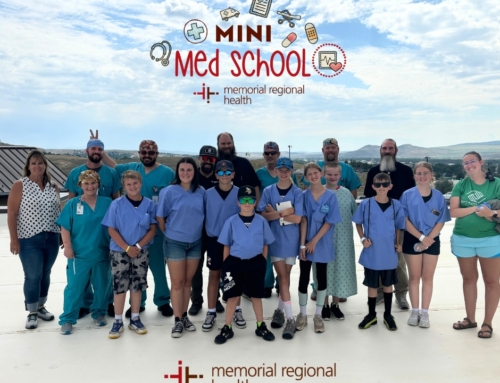As we age, our ability to handle medications decreases. That’s because, along with our skin, eyes and ears, our internal organs are growing older, too. With age, our kidneys and liver begin to wear down, leaving us less able to metabolize drugs. Unfortunately, most people age 65 or older take at least five to six medications every day. That combination can lead to adverse drug reactions or drug interactions, requiring seniors to be careful and thoughtful about what they take.
“Take the fact that the elderly have compromised function, and we add five or more medications to their daily intake. It’s like a toxic cocktail, so it requires regular monitoring — and the fewer drugs the better,” said Karen Sweeney, PharmD, clinical pharmacist and a certified geriatric pharmacist with Memorial Regional Health.
She believes that what’s called polypharmacy — taking five or more meds at a time — is one of the major players in drug interactions. That’s why it is important for the elderly to carefully review the medications they take with their doctor and ensure they are on the right dose and all medications are needed.
Sweeney suggests the following three tips to avoid drug interactions and reduce medications to only what you need.
• Make sure your doctor isn’t treating an effect of a medication: “What can happen is that a person feels dizzy or nauseous, typical drug side effects, and they tell their doctor. Their doctor then prescribes a medication for dizziness or nausea. Now, they are on another medication, one they really don’t need, while the symptom that they felt could have possibly been fixed by adjusting down the dosage of one of their other medications,” Sweeney said.
When she consults with a patient who is on several medications, she works with their provider to reduce the number of drugs by withdrawing one at a time to see how the patient does, and she may also talk to the provider about reducing the dosage level of others when it makes sense.
• Don’t be afraid to question your provider: Elderly people grew up in a generation where it was impolite to ask questions of a medical provider. Today, most providers welcome questions from their patients.
“Speak up. Tell your doctor what you are feeling, and ask questions. You need to be your own advocate. The more they know, the better they can take care of you,” Sweeney said.
It’s also a good idea to bring someone with you to your appointments who can help keep the conversation on track and take notes, as needed, such as a son or daughter. Sweeney has a patient in her Coumadin Clinic who, through the help of her provider and Karen, was able to get her dose just right for coumadin, and adjust her other medications to the ideal level. Today, she feels better than she has in years.
• Bring your medications, supplements and OTC medications to every appointment: As we age, we develop chronic illnesses, and often, that means seeing several doctors at the same time. Seeing multiple doctors and specialists can set elderly folks up for polypharmacy and drug interactions. That’s why it’s important to tell each doctor what you are taking, and there’s no better way to do so than showing them the actual bottles. Pack all your medications into a bag, and bring them to every appointment. Sweeney encourages people to tell their doctor if they are on an antibiotic, even if it’s short term. Certain antibiotics can interact with blood sugar medication, causing hypoglycemia.
“People don’t think it’s important to mention supplements or drugstore medications, because they think since they are over-the-counter, they are innocuous. That’s not the case. Some drugs interact with supplements. For example, green tea affects warfarin,” Sweeney said.
Remember, the more medications you are on, the more chance you have for a reaction. Be thoughtful and careful about what medications you take, and regularly review your medications with your doctor.
“Often, elderly folks don’t need high doses of medications due to their decreased liver and kidney function. Keeping doses as low as possible helps lower the risk of adverse drug reactions,” Sweeney said.





